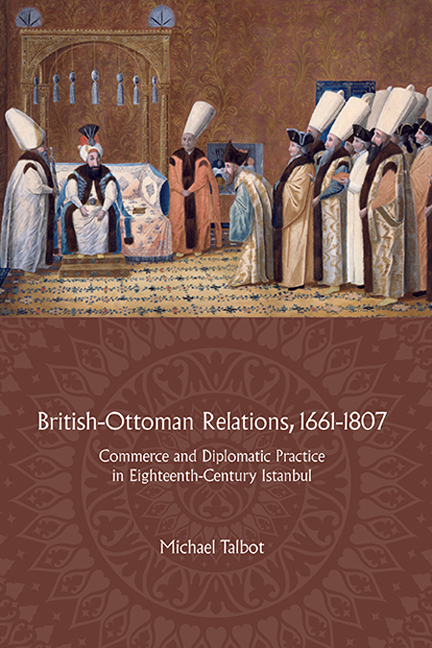 British-Ottoman Relations, 1661-1807
British-Ottoman Relations, 1661-1807 Book contents
- Frontmatter
- Dedication
- Contents
- List of tables and figures
- Acknowledgements
- Note on languages, place names, dates, and currencies
- List of abbreviations
- Introduction: De/re-constructing the history of British–Ottoman relations
- 1 The framework of relations
- 2 The office of ambassador
- 3 Trade and diplomatic finances
- 4 Gift-giving
- 5 Diplomacy as performance
- 6 Negotiating disputes
- Conclusions: De/re-constructing British–Ottoman diplomacy
- Bibliography
- Index
Introduction: De/re-constructing the history of British–Ottoman relations
Published online by Cambridge University Press: 29 July 2017
- Frontmatter
- Dedication
- Contents
- List of tables and figures
- Acknowledgements
- Note on languages, place names, dates, and currencies
- List of abbreviations
- Introduction: De/re-constructing the history of British–Ottoman relations
- 1 The framework of relations
- 2 The office of ambassador
- 3 Trade and diplomatic finances
- 4 Gift-giving
- 5 Diplomacy as performance
- 6 Negotiating disputes
- Conclusions: De/re-constructing British–Ottoman diplomacy
- Bibliography
- Index
Summary
Approaching eighteenth-century diplomatic history
The history of British–Ottoman relations in the long eighteenth century begins and ends with a voyage at sea. In March 1661, the Earl of Winchilsea arrived at his residence in Istanbul's Galata district after a rough winter's journey of four months aboard HMS Plymouth. Winchilsea was one of the first ambassadors appointed by the new King Charles II (r. 1660–85), and was perhaps the highest ranking of the ambassadors that the British dispatched to the court of the sultan. Full of confidence in himself and the reputation of his monarch, Winchilsea wrote that ‘[t]here is no public minister at this Porte that hath the like esteem as I find here’. This formal re-establishment of relations after the uncertainty of the Commonwealth – when king and parliament had rival ambassadors in Istanbul – was full of promise, with British merchants plying a successful trade in Ottoman marketplaces, and with Britain seen to be in greater diplomatic favour than France following French intervention in the long-standing siege of Crete on the side of the Ottoman's enemy, Venice.
Fast-forward almost 150 years later to January 1807, and we find another British warship anchored in the harbour of Galata. In the midst of a new phase in the wars that had been engulfing Europe, the Ottoman Empire had embarked on a war with Britain's ally and coalition partner, Russia, as part of an alliance with France. The British ambassador in Istanbul, Charles Arbuthnot, had strict instructions from his superiors in London to do his best to lessen French influence over Sultan Selim III (r. 1789–1807), and to bring a swift end to the Russian conflict that was detracting from that state's efforts against France. However, the Ottomans refused to bow to British pressure, and so the British warship HMS Endymion was stationed at the imperial capital to send a serious message to the government of the Sublime State. As tensions continued to build, it became clear that Arbuthnot's position was untenable. On 29 January, the ambassador invited the British merchant community to dine with him upon Endymion, and without a word of warning the ship set sail away from Galata towards the Dardanelles.
- Type
- Chapter
- Information
- British-Ottoman Relations, 1661-1807Commerce and Diplomatic Practice in Eighteenth-Century Istanbul, pp. 1 - 16Publisher: Boydell & BrewerPrint publication year: 2017


